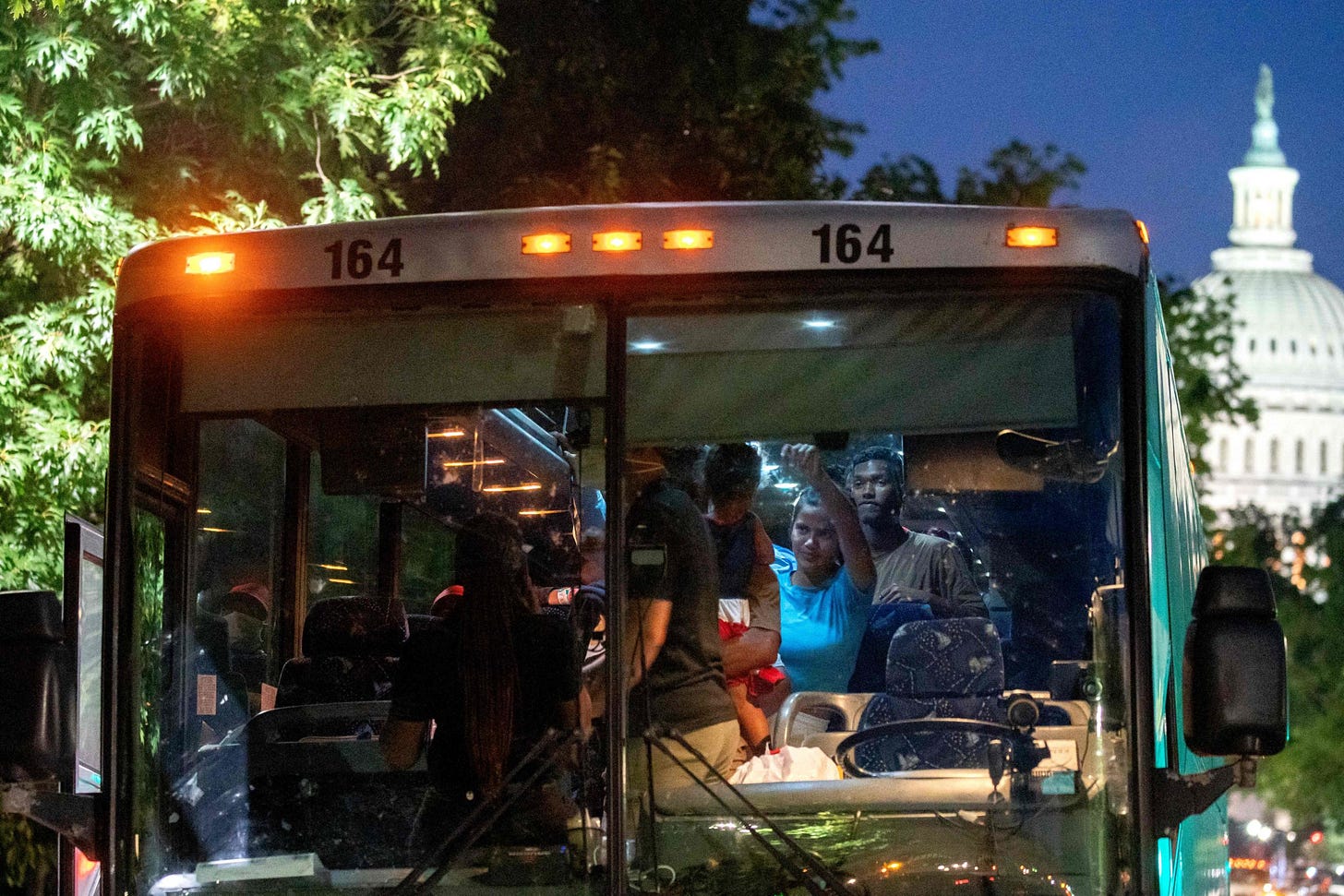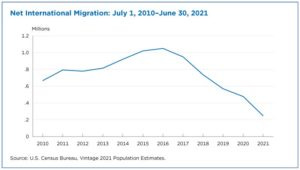We Need an America First Immigration Policy
Our immigration system should put the country’s needs first—and we need more labor.

Postcards from the great American labor shortage: A couple arrives at the Seattle airport after a 5-hour flight and stands in line at the car rental desk. It quickly becomes clear that something is wrong. The line snakes through the garage. People are angry. At the desk sits a harassed employee explaining that while, yes, he understands that people had made these reservations months in advance, he simply has no cars of any kind to rent. Nothing. Why? There aren’t enough employees on hand to vacuum, wash, fuel, and process the cars.
Another snapshot. A couple has been driving for several hours and requires a bathroom stop. They pull into a Burger King. The doors are locked. The only service is at the drive through. Why? Lack of employees.
Perhaps you’ve stayed in a hotel recently? Maid service and room service are scarce. If hotels offer these services at all, they are available only upon request. About 25 percent of restaurant and hotel employees are immigrants. What could be going on here?
It’s not just entry level jobs that are going unfilled. Politico reports that hospitals in 40 states have reported critical staffing shortages—orderlies and janitors, yes, but also nurses, doctors, and medical technicians. One in five nurses and one in four health aides are foreign born. Twenty-eight percent of physicians are immigrants.
That dining room set you’ve been waiting to have delivered? A shortage of port workers and truck drivers is slowing everything down. My colleague Sarah Longwell captured it well when she observed that since the COVID pandemic, “Everything works 15 percent worse than before.” More airline delays. Fewer varieties of foods in supermarkets. Shortages of lumber, cars, and consumer electronics.
And, as you may have noticed, everything is much more expensive.
The reasons for this are multifactorial. Plunging demand for cars during the pandemic, for example, induced the industry to slow down its production. It takes time to ramp back up. The inflation we’re experiencing is partially a result of the government flooding too much cash into people’s accounts, compounded by COVID-induced supply chain shocks and the disruptions caused by Russia’s invasion of Ukraine.
But the one factor we discuss too little is immigration—or rather, when we discuss it we emphasize the wrong aspect. Republicans are obsessed with the southern border and the dreaded waves of people (or sometimes “caravans”) attempting entry. But we’ve long had people thronging the Mexican border. What we haven’t seen in many decades is a serious decline in the number of legal immigrants—a decline that is a big factor in all the things Americans dislike about how things are going right now. If an immigration advocate had wanted to concoct a scenario to demonstrate to Americans just how diminished their lives would be with fewer immigrants, they couldn’t have devised a better scheme than the combination of the Trump administration and the pandemic.
Trump began his squeeze on immigrants in 2017 with a ban on immigration from seven Muslim-majority countries and followed up with drastic reductions in the number of green cards issued, the number of refugees admitted (a shameful policy choice), and the number of legal immigrants processed. A Government Accountability Office review found that the Citizenship and Immigration Service increased its processing time for immigration applications sixfold between 2015 and 2020. This was intentional. Trump officials threw sand into the gears. They raised fees for naturalization applications from $620 to $1160, and added burdensome, niggling requirements. A 2019 rule, for example, forced immigrants to refile forms if they left a space blank, even if the question did not pertain to them. Interviews were stalled, and they starved the relevant agencies of funding. Greg Chen of the American Immigration Lawyers Association told the Economist that “The Trump Administration came very close to bankrupting the USCIS in 2020.” A shortage of immigrants is driving up wages, which in turn drives up prices and causes inflation. If left unchecked, the dearth of high-skilled immigrants is going to threaten our competitiveness.

U.S. Census Bureau
Where is the outrage that we are turning away highly-skilled immigrants who could make the difference in our competition with China? Wouldn’t an “America first” policy capitalize on our desirability as a destination for the talented instead of slamming our doors? Wouldn’t we be welcoming those who will create the key technologies for the future, like artificial intelligence?
Before Trump, Republicans used to stress that they were all for legal immigration but only opposed the illegal variety, but that’s all changed now. In fact, as Alex Nowrasteh at the CATO Institute argues, Trump failed to budge the number of illegal immigrants in the United States but radically diminished the number of legal immigrants. Sen. Tom Cotton and other Republicans are now on the record as favoring less legal immigration. According to some estimates, if the immigration rate had remained unchanged during Trump’s term, we would now have nearly 2 million more prime-age workers.
Those workers would be driving trucks, administering IVs at hospitals, cleaning hotel rooms, picking vegetables, and designing software. They’d be starting businesses (immigrants are 80 percent more likely to do this than native-borns), paying taxes, and caring for the elderly. And, by the way, they would be helping to bring down the overall price level.
But Trump distorted the Republican party into a xenophobic, blinkered cult that wrongly sees immigrants as a drain instead of a boon.
So the question Republicans must answer today is: How do you like this immigrant-starved America? How do you like the shortages, the inflation, and the poor service? Because this is what comes of nativism.


